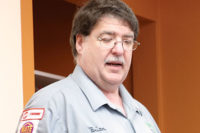As commercial building codes are mandating higher and higher building performance, and as forward-thinking customers are continually looking for ways to make their buildings as green as possible, many mechanical contractors are learning that possessing the right credentials, both as an individual and as a firm, can ensure the job is done right and the customer is satisfied.
“It’s identifying folks who basically may be a little bit better at what they do than the next guy,” said Tom Phoenix, ASHRAE past president and principal and vice president at Moser Mayer Phoenix Associates in Greensboro, North Carolina. “That’s almost stating the obvious, but having served on the certification committee at ASHRAE, it really isn’t that obvious for some.”
CERTIFICATIONS ELICIT TRUST
High-performance-building-related credentials from certifying bodies like ASHRAE, the Building Performance Institute Inc. (BPI), the U.S. Green Building Council (USGBC), the International Code Council (ICC), and many others can help mechanical contractors show they have expertise and experience in certain areas. This, said Billy Austin, principal at Shultz Engineering Group in Charlotte, North Carolina, immediately helps build trust between clients and the contractors.
“Throughout my career both as a contractor and as an engineer, the challenge I’ve had, and I think everyone has had, is how can clients trust you as the expert — how can you display that you have the experience and background to do the job?” Austin asked. “One good way to demonstrate that is by holding a certification that demonstrates you have expertise and experience in that area. With the certifications I hold, I feel like I can refer to my credentials when a client might ask those types of questions.”
For Phoenix, who holds numerous merits, including ASHRAE’s Building Energy Modeling Professional (BEMP) and Building Energy Assessment Professional (BEAP) honors, certifications are an important part of his company’s culture.
“We have a number of certifications that individuals have in our firm,” he said. “For example, one of our fire sprinkler designers is NICET [National Institute for Certification in Engineering Technologies]-certified in several areas of fire protection design, and the most common certification for an individual is LEED [Leadership in Energy and Environmental Design] AP, which allows one to manage the LEED process for the USGBC’s building certification program. A number of us are certified to do that.”
Being properly credentialed to work on high-performance buildings can also build contractors’ and technicians’ confidence, Austin added.
“Personally, of course, there’s the confidence that comes from not only thinking but knowing individuals have demonstrated to the technical organizations that they hold the expertise in that area to their expected satisfaction level,” he said. “There’s some confidence that comes from that.”
BECOMING A REQUIREMENT
While professional licensure has long been a requirement in the industry, certifications have only recently become more popular, said Benjamin Skelton, president of Cyclone Energy Group in Chicago.
“I think they’ve really come to be more popular over the last few years as more stringent ordinances and building codes come up,” he said. “A licensed architect and engineer have always been necessary for the design of buildings, but now that more performance-based standards are in codes and cities are putting in benchmarking ordinances, we’ve seen a trend from cities and governments to really make sure the right people are working on these types of projects. They don’t want to have people at the city reviewing things for technical competency — they want to make sure they have people who are already technically competent.”
Skelton, who holds ASHRAE’s BEMP and Commissioning Process Management Professional [CPMP] certifications, among others, said earning many of these industry credentials is not an easy process, which is part of why they’re so valuable.
“It’s a very comprehensive process,” he explained. “ASHRAE certifications are very unique in that they’re a body-of-work type of certification — they’re not just exams where you just fill in the blanks. If you don’t have the experience, you’re going to have a very difficult time passing these exams.”
In fact, Skelton didn’t pass the BEMP exam the first time he took it. “There was a whole part on modeling that I hadn’t looked at before,” he said. “I’m not afraid to share that I failed the first exam, because it shows how meaningful it is that it’s hard to pass.”
As these credentials continue to grow in popularity, some have become a requirement in certain states or municipalities, especially when it comes to commissioning.
“Some cities have ordinances that require some commissioning to be performed on buildings,” Skelton said. “The City of New York has a program called Local Law 87, or LL87, and the CPMP is one of the approved certifications that one can possess to perform that service. We also have an ordinance here in Chicago where they have to report their energy use, and the BEAP [Building Energy Assessment Professional] is one of the required credentials for the building benchmarking ordinance.”
Phoenix also used building commissioning as an example of where certifications have not only become commonplace but required in some areas.
“Over the last 10-12 years, building commissioning has become very popular, and it’s done to make sure, for new construction, that it’s built the way it was designed to be, and they even do existing buildings to make sure they’re tuned back up to operate the way they were designed,” Phoenix said. “Every state — and, in some cases, municipalities — have different requirements. In North Carolina, for example, the state has ruled that to do commissioning, one must be a licensed professional, and he or she has to be certified as a commissioning agent, which means the individual has had to have gone through the training and testing for one of the three recognized agencies. So, in addition to your professional license, you have to have a commissioning certification. That’s what we do in North Carolina.”
While some states and cities may require certain credentials, other areas may have no requirements at all aside from experience, which is just another reason to earn applicable certifications, Phoenix said. “The credential requirements really do vary from place to place, and that in and of itself is justification for certification and a reason to have certification. That way, you’ve got it, and you’re recognized as having that knowledge and expertise, and you won’t have to go through the hassle of having to prove that wherever you go.”
GETTING A LEG UP
By showing that a mechanical contractor has the experience and knowledge to do the job, certifications can help firms win bids.
“In marketing our company to clients, we’re looking to demonstrate to them that we have the capabilities and expertise they’re looking for, and this is a natural way to do that,” Austin said. “It makes marketing a lot easier if you have something concrete to demonstrate immediately.”
In addition to helping businesses, credentials also help individuals advance their careers for more than one reason.
“As we well know, an interview of a prospective employee can be dicey,” Austin said. “You’re just basically going on your gut instinct whether you have a connection or not, but you don’t really find out what type of employee you’ve hired until after he or she’s been hired, so it would be great if there were credentials that could also demonstrate to me, as the employer, that not only does this individual have expertise, but he or she cared enough to go out and pursue and maintain these certifications. It’s not just the technical knowledge, but that the person cares enough about his or her career to pursue these credentials.”
“It gives you a leg up,” Phoenix said. “A credentialed individual is a step ahead of everybody else. If several people are chasing the same job, it never hurts to be a little bit more credentialed than others vying for the same position. It also provides an acknowledgement of an individual’s skills and his or her expertise in a particular subject. Certification is a form of self-improvement, if you will.”
For mechanical contractors looking to do more work with high-performance buildings, discerning which credentials are accepted or required by local and state ordinances and building codes and encouraging employees to earn those credentials is a path to success.
“If an employee is just starting to get into it, there are organizations that offer training,” Skelton said. “ASHRAE has training. AEE [Association of Energy Engineers] has training classes on modeling, commissioning, retrocommissioning, and things of that nature. Those are good places to start. If a person is interested in becoming certified, he or she has to take the exams.”
“Certifications are a way to learn skills and then show the outside world that, yes, I have learned enough, am skillful enough, and have enough experience that I can be certified in this particular area,” Phoenix added. “It’s a personal achievement as well as a competitive edge. That, to me, is what certification is all about.”
Publication date: 7/25/2016








